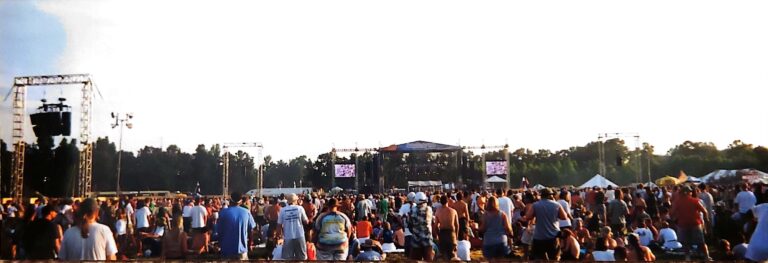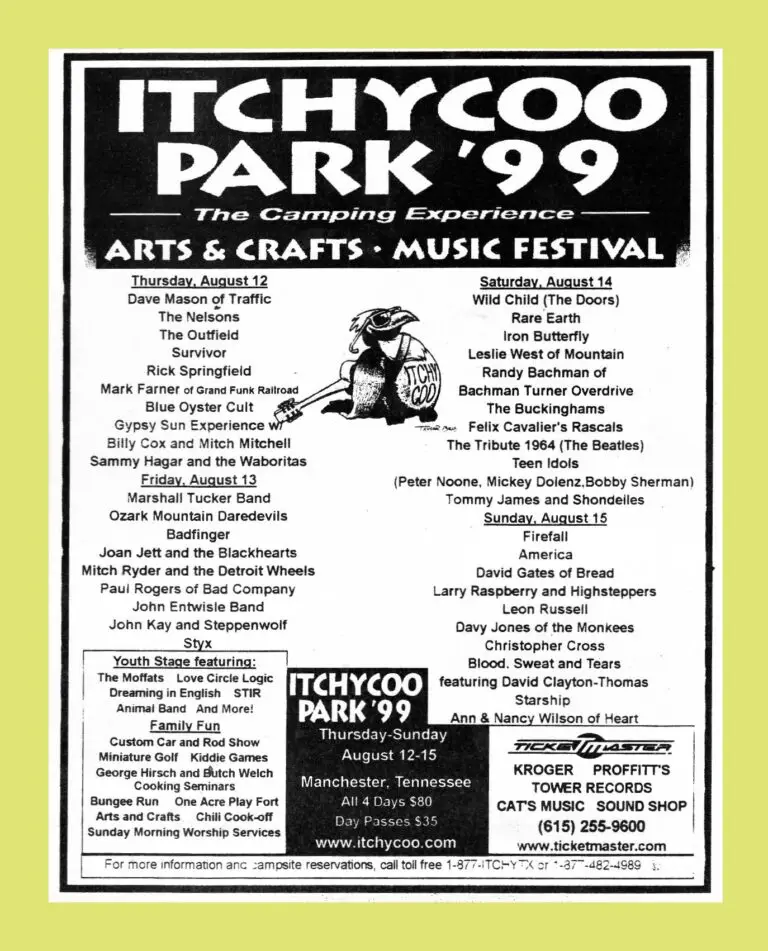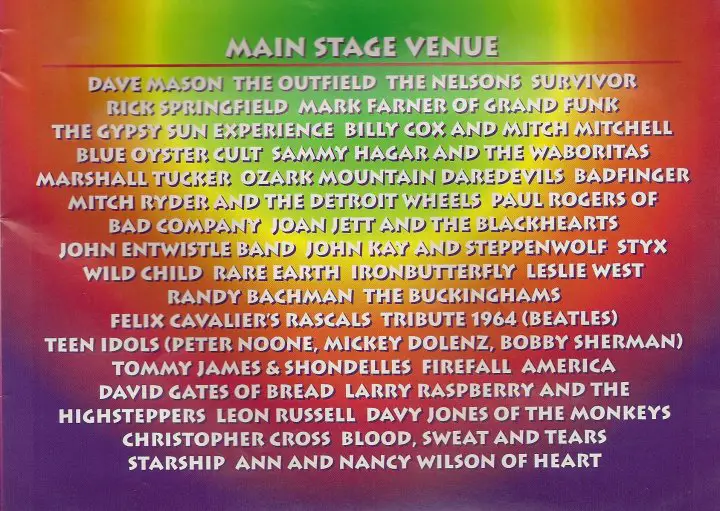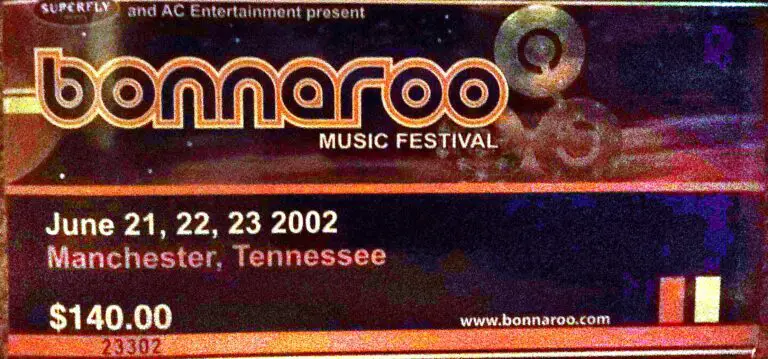Today we look back at perhaps the most memorable and influential music festival of the 21st century, the first Bonnaroo. Held June 21-23, 2002 in Manchester, TN, Bonnaroo has helped pave the way for the success of the modern day music festival. The original 2002 edition skewed jam band-heavy when compared to the contemporary version, but the communal vibes and appreciation for live music that the festival has fostered over the years have only gotten stronger. Discover how the first Bonnaroo Music and Art festival came to fruition, the memorable musical offerings that weekend, and how the festival laid the groundwork for successful music festivals in the years and decades that followed.

Origins
Bonnaroo, in name alone, is steeped in musical culture. The word derives from the French words “bonne,” meaning “good,” and “rue” which means “street.” This was done out of respect for the music tradition of New Orleans, a spirit the founders of Bonnaroo were looking to carry over into their next venture. And even more fittingly, “bonnaroo” also serves as Creole slang for a “really good time,” the very essence of any successful music festival.
Not only that, Angola Prison was located on Bonnaroo Avenue. To be on that street, and not in prison, was naturally, a good thing. The cajun expression “desitively bonnaroo” came to mean “better than the best,” originating among the inmates of the South Louisiana prison, for if you were on that street and not in the prison, it was “desitively bonnaroo.”
Not only that, Angola Prison was located on Bonnaroo Avenue. To be on that street, and not in prison, was naturally, a good thing. The cajun expression “desitively bonnaroo” came to mean “better than the best,” originating among the inmates of the South Louisiana prison, for if you were on that street and not in the prison, it was “desitively bonnaroo.”
The closing of Knoxville’s World’s Fair Park in 1999 unknowingly got the ball rolling for the creation of Bonnaroo. The park had been the yearly home of the Hot Summer Nights music festival until construction forced concerts to no longer be held there. Festival founders AC Entertainment were forced to pivot and look elsewhere and from there the seeds of Bonnaroo were hatched.
The closing of the World’s Fair Park for concerts precipitated getting creative and trying to find, ‘OK, if we can’t do this anymore, how can we still participate in the summer outdoor concert business,’ and it was from that that Bonnaroo was ultimately launched.
Ashley Capps, co-founder AC Entertainment
Bonnaroo seemed like a natural name for the massive new venture on a giant farm in Manchester, TN. Not only for the aforementioned translations, but the term itself wasn’t completely foreign either after being introduced to pop culture through Dr. John’s 1974 release Desitively Bonnaroo.

Superfly, who produced shows during New Orleans Jazz Fest in the late 90s, had experience in staging 28 shows over 8 nights at various New Orleans venues, typically late-night and catering to jam band fans. Superfly founders Kerry Black, Rick Farman, Richard Goodstone and Jonathan Mayers had attended Glastonbury and Coachella Festivals in years prior, and used these experiences to frame their vision for Bonnaroo Music and Art Festival.
The Superfly team brought in Coran Capshaw, who managed Phish and Dave Matthews Band, among others, to assist with financing, and worked with regional promoter Ashley Capps (AC Entertainment), based out of Knoxville. Working together, Superfly, Capshaw and AC Entertainment combined resources and dove in feet first, creating America’s most successful multi-day camping music festival since the original Woodstock.
Farman spoke to Relix in April 2002 noting that the first task was to establish bonafides to the fans:
The first thing that I think is important to let everybody know is that we have an extremely experienced and professional crew behind this event. I know many people know Superfly from the events we’ve done at Jazz Fest and other things. And I know people know AC for the events he’s done. But what I really wish to emphasize is that we have hired the best people in the camping festival business to help us put on this event. We have a lot of experience between AC and us in putting on concerts and concert promotion but we certainly understand that our experience is limited in putting on an event of this size.
Our basic plan has been to make the learning curve zero. Most of the people that we’ve hired were also key players in putting on the big Phish events- everything from our project manager, site coordinator, vending consultant, production manager, parking company, business manager, the head of security and the different security companies that were hiring. We’re going to have Clean Vibes out there, which I think people know through many events, including the big Phish events. So in terms of the quality of the people putting on the event and the quality of the facilities, its really going to be top notch.
Rick Farman, as told to Relix
The location the team would choose was found in Central Tennessee, in the small Coffee County town of Manchester. Located an hour drive southeast of Nashville, the town of less than 9,000 at the time had previously served as host to at least one previous music festival, Itchykoo.

Named for the Small Faces song “Itchykoo Park,” the festival was held only once, from August 12-15, 1999, featuring 40 bands over four days and nights. The event sold 20,000 tickets, but the event did not repeat, something apparent before the weekend concluded, with event staff reportedly departing mid-shift when it became clear their work would not be paid.
The classic rock-centric festival featured Dave Mason, Survivor, Rick Springfield, Blue Oyster Cult, Sammy Hagar, Joan Jett and the Blackhearts, Iron Butterfly, Leon Russell, Davy Jones and Mickey Dolenz (performing separately), Starship and the Wilson sisters from Heart. The lineup, while ambitious, did not have a true headliner, but instead a list of classic rock bands with no clear connection between the artists.

Itchycoo not returning to Manchester for additional installments, coupled with World’s Fair Park closing for construction, made the perfect conditions for Bonnaroo to arrive in 2002. Of course, the two festivals would have a similar sounding name, and an ambitious first year endeavor like Bonnaroo needed to establish their brand as distinct from the predecessor, at least to all who were aware of Itchykoo. With a name that signified a ‘good time,’ was the name of a street in New Orleans as well as a Dr. John album, confusion with the 1999 festival was not a factor.
The location in Manchester, a 700-acre farm with access roads left over from Itchykoo gave it perfect location next to I-24, something that was a necessity for any major music festival to ensure easy access for arriving fans. The farm was purchased in 2007, and a permanent power source was added shortly after, so as not to use the TVA hookup that accounted for 70% of all power, with the rest coming from generators.
On March 13, 2002, with little advertising, tickets for Bonnaroo went on sale, at an initial cost of $100, eventually sold for as much as $170. Tickets were sold exclusively through the Bonnaroo website, with 10,000 tickets sold the first day. Within the first week, 70,000 tickets were sold, and the festival announced a sell out on March 24. Within 11 days, and mostly by word-of-mouth, Bonnaroo had sold out their first year with a lineup and vision that fans agreed with.

There was of course another failed festival in 1999 that also had an impact on Bonnaroo, and music festivals in general. Woodstock 99, which quite publicly showed Baby Boomer greed meeting Gen X angst, in full view on MTV. While Itchykoo failed due to lack of headlining acts and lack of funding, Woodstock tarnished a brand permanently, with founder Michael Lang unable to celebrate the 50th anniversary of Woodstock with a festival 20 years later.


Comments are closed.